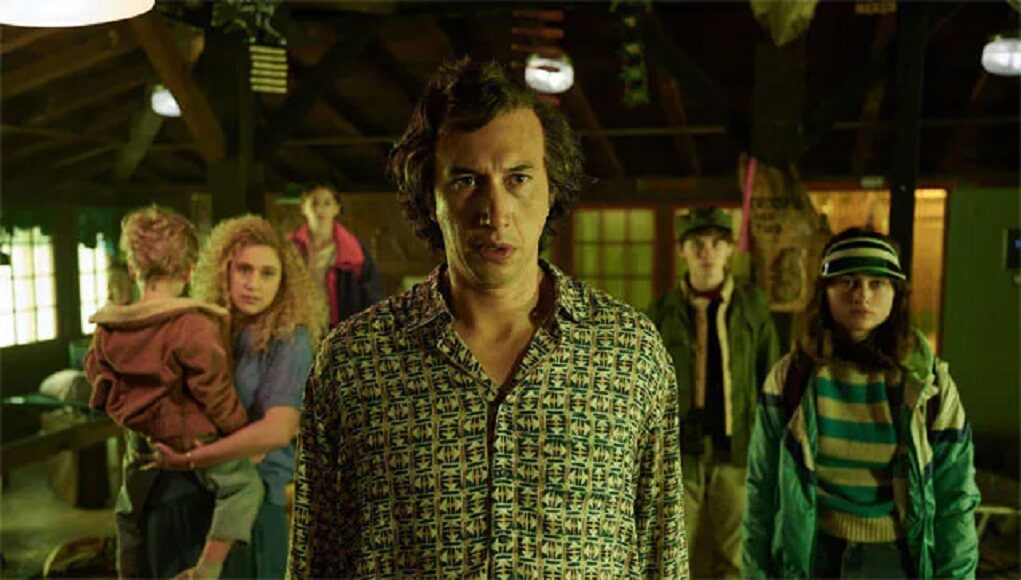In a scene from Netflix’s White Noise, Babette, an eccentric and possibly ill wife played by Greta Gerwig confides about something with her husband. “This is not a story about your disappointment in my silence. The theme of this story is my pain and my attempts to end it,” she says, as a sort of rebuke. This particular sequence is evidence of the Don DeLillo’s asphyxiating hold on material that for the longest time was considered un-filmable. And yet Noah Baumbach, stumbles past expectations with somewhat modest results in a film that though it somewhat captures the quirky absurdities of the novel, can’t cohere enough to also qualify as an affecting post-modernist tale. White Noise emblematised the degradation of American civilisation, but here in film form, it can also feel like a sketch of some of the country’s anxieties and eco-concerns put together on the go.
Jack, played by Adam Driver with a paunch, is a professor of ‘Hitler studies’ and gives lectures akin to street theatre pieces. In one dizzyingly bizarre but hilarious set-piece he crescendos with a speech that pits Elvis, a bonafide American icon, as the spiritual equal of Hitler. Jack is married to Babette, a secretive but also charming wife, played by Gerwig. The couple have three children, each of whom are curious about everything. In a pre-internet age, this curiosity beams across television screens with footage of plane crashes or with general intrigue around a cataclysmic event that might end life itself. The point, as Jack screams in one scene is that ‘no one wants to pay attention to what is actually happening’. Instead, everyone obsesses about what might be or isn’t.
DeLillo’s book was garrulous, full of snarky lines and biting humour but also reams and reams of context that could disappear between pages. It’s a post-modern marvel, that simply refutes the tendency to coalesce into one, and is what possibly made the book un-adaptable in the first place. Baumbach manages to at least give the film a trajectory but in doing so, he struggles to also lift the writer’s print and impose his own. Directorial flair for compensation notwithstanding, the best parts of the film are still in the lines, as opposed to anything the Director manages to do with the camera or his vision.
The book obviously had some iconic passages, chief among which was the giddy detailing of the new American obsession with malls and drugs. Here both are present but evoked to unequal effect. A hilarious conversation between a doctor and Jack about a drug called ‘Dylar’ is unmatched by bits from the shopping malls, that were viscerally described in the books. Not all of the humour lands, for Jack’s intellect is at odds with his lazy persona, a direct fallout maybe of trying to visualise what this loud and at times obnoxious family actually looks like. That said, Driver and especially Gerwig are adept in their roles, not too far off from boisterous characters they have played in the Director’s previous films.
The problem with White Noise, is predictably its enviable but ultimately seamless barrage of ideas. A book allows you break but a film must cascade one sequence and cut after the other. As a reader it’s easier to invest as well as withdraw, but in cinema, a thread must lead to the germination of another. In the film form, the wait to untangle that which is never going to come, can become a tedious exercise in managing expectation. Filmmaking, unfortunately is a limited medium, and it shows in this adequate but fatally disjointed film which proves that not everything obtuse, can be moulded through artistic interpretations. Sometimes things strike because of the medium and not just the messaging alone.
White Noise does have its moments. The gloriously awkward lecture, the vociferous camaraderie within the family, Gerwig’s Babette and political standpoints galore, there is a lot to like about a film that simply cannot escape the verbose origin of its core. DeLillo’s influence is stark here, as characters amount to the things they say, rarely foraging a personality beyond the cult of their latest lines. As shrewd and smart as they sound, Jack and his family simply struggle to grow on you the way cinematic characters ought to. As literary creations they are endlessly fascinating, but as living-breathing examples of Americans we must entrust with our common anxieties and ambitions, they seem as far-fetched as could be humanly possible.
Part of the reason why the novel is considered a classic is its ability to change form with chapters and retain its dreariness and existentialism. In the film form, these elements are both touch and go, prisoners of that which will be spoken rather than that which can be sensed and quantified. i.e. emotion. White Noise isn’t exactly poor, but it simply struggles to package the exotic absurdism of the book. To which effect, maybe it was un-filmable after all.






